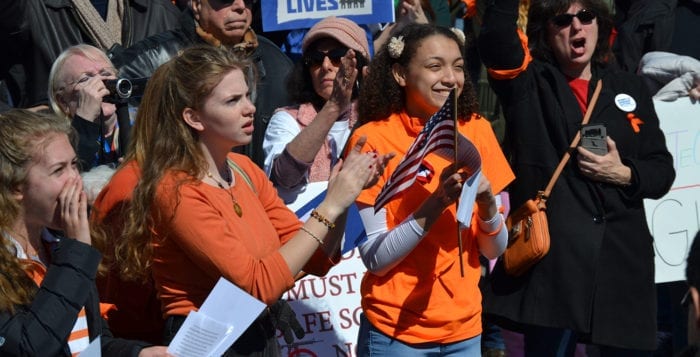The 1980s rock band White Lion said it best when they sang: “When the children cry let them know we tried, ’cause when the children sing then the new world begins.”
Children across the country ensured their cries were heard March 24 when millions of them took to the streets to call for implementation of stricter gun control laws as part of hundreds of March for Our Lives rallies. Now we have a challenge for them and the parents and grandparents who joined them — keep the momentum.
The rallies were inspired by the battle cries of students who survived the school shooting in Parkland, Florida. For centuries, protesting has been a popular way to get politicians to pay attention, but those rallying calls need to be followed by action in order to get things done. We surmise many if not most of the student marchers understand this is just beginning, like Avalon Fenster, one of the organizers of the March 24 rally in Huntington.
“In the long term, we want to get youth more civically involved, collaborating with elected officials to create legislation that makes our lives a priority,” Fenster said.
It’s something Port Jefferson High School students Ben Zaltsman, Matt Pifko and Gavin Barrett also get. These students helped establish a station in their high school where their peers can get assistance in writing letters to their representatives. Letter writing, emailing and calling the offices of elected officials is a vital process to let legislators know what their constituents want and need.
However, writing to a congressman is not the end of the line either if true change is the students’ goal. All the letters and phone calls in the world mean nothing if a person isn’t registered to vote. The March for Our Lives website, www.marchforourlives.com, has set up a form to make it easier for voters to register. It’s a rite of passage and a civic responsibility when a teen turns 18. High school students who are heading off to college in the fall need to also familiarize themselves and their peers with the process of obtaining and
submitting an absentee ballot. If you are registered to vote in Setauket but go to school at SUNY Cortland, unless you’re driving home on the morning of Nov. 6, an absentee ballot is your only option.
Simply showing up to fill out a ballot is not enough either. People of all ages need to ask themselves what matters most to them, and then see how their representatives in the U. S. Senate, House of Representatives and state positions vote on issues.
There’s one more step 18-year-old marchers need to keep on the table as well. If you feel you and your community are not being represented effectively by those in power, consider running for office, or at least help those who represent your interests get elected. That’s what 24-year-old Josh Lafazan did last November, and he became Nassau County’s youngest legislator. For a few political offices — including New York State senator and assemblyperson — the minimum age requirement is 18 years old. To serve in the federal government, you must be at least 25 years old.
Leslie Gibson, a Republican candidate for the Maine House of Representatives, is a living embodiment of what is possible. He recently dropped out of his race after receiving criticism for remarks he made on Twitter about Marjory Stoneman Douglas High School students, including calling Emma Gonzalez, who has been in the forefront of the movement, a “skinhead lesbian.” He had been running unopposed, but after he made the comment, challengers sprung up from both parties, including a 28-year-old Democrat who had never considered seeking political office before.
We’ve heard the children’s cries. Now the real work begins.





